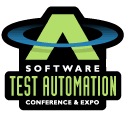Software Test Automation Fall 2003

PRESENTATIONS
|
A Formula for Test Automation Success: Finding the Right Mix of Skill Sets and Tools
Not sure what elements to consider now that you're ready to embark on the mission of automating your testing? This session explores the possibilities-the key mix of skill sets, processes, and tools-that can make or break any automation effort. The instructor shows you how to develop an informed set of priorities that can make all the difference in your effort's success, and help you avoid project failure.
|
|
|
A Roadmap for Software Testing Tools
Materials are not available at the request of the speaker. |
|
|
A Survey of Approaches for Test Automation
This paper will help you understand approaches to test automation that have worked, identify some common requirements for success, determine which contexts favor the different approaches, contrast benefits and risks of using different product interfaces (GUI, API) for automation, and how to select a test automation architecture suitable for your project. |
|
|
Adventures in Test Automation of Embedded Systems
Has your organization ever wondered about the various types, levels, and approaches to automation in testing embedded software-systems, and how you "stack up" in using them? Examine both the common test automation practices and unique particular problems by acquiring reference pints to compare against. |

Jon Hagar, Jon Hagar Educational Services |
|
Application Performance and Reliability Management - 24x7
Managing system performance and reliability has never been as significantx0151or as challengingx0151as it is now. These days, most organizations have multi-technology, multi-vendor, multi-tier environments. In other words, it’s a world rife with 24-hour, alwaysx0151on complexity. Add to this the need for continual changes to react to shifts in business conditions, technology advances, and mixes of demands and you have a recipe that calls for the highest level of performance and reliability possible. |
|
|
Assessing Automated Testing Tools: A "How To" Evaluation Approach
You've been assigned the task of evaluating automated testing tools for your organization. Whether it's your first experience or you're looking to make a change, selecting the "best" automated testing tool can be a daunting task. With so many toolsets available, we sometimes make decisions that don't provide appropriate functionality. This presentation takes you through a number of steps that should be understood--and addressed--prior to acquiring any regression or performance-based toolset. |
|
|
Automated Database Testing: Testing and Using Stored Procedures for Testing
Today's heterogeneous data environments place a heavy burden on test engineers. Applications must be tested for seamless interface with the back-end databases, but often this goes beyond what popular test automation tools can provide. Testers must know how to create and use SQL, stored procedures, and other database objects to effectively test today's data driven environments. |
|
|
Avoiding Test Automation Pitfalls and Guaranteeing Return on Investment
Companies that have attempted to implement test automation for functional testing have discovered-usually the hard way-that it isn't easy. This presentation takes an in-depth look at the specific pitfalls companies encounter when implementing automated functional testing, and offers real-world, proven best practices to avoid problems and guarantee long-term success. You'll learn about an ROI model successfully used by companies for automated testing efforts, and learn to identify the key areas upon which to focus your test automation. |
|
|
Differential Testing: A Cost-Effective Automated Approach for Large, Complex Systems
Differential testing is an automated method you can use in testing large, complex systems. It's especially useful in situations where part or all of an existing production system is being upgraded, and the end-to-end functionality of the new system is expected to be the same as the old one. Rick Hower uses two case studies to provide descriptive examples of this novel and surprisingly effective approach. |
|
|
Home-Brewed Test Automatioin: Approaches from Extreme Programming Projects
Projects that use eXtreme programming (XP) often do not use commercial GUI test tools, finding it more useful to build their own support for test automation. This session explains the strategies they've used, which can actually cross over to any project where developers take responsibility for building support for automated testing. The XP community has already made an impact on the tools and practices for unit testing in the wider development community. The instructor reviews the potential impact on customer-perspective testing. |
|


